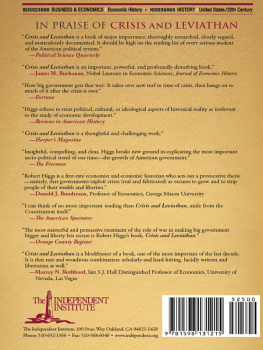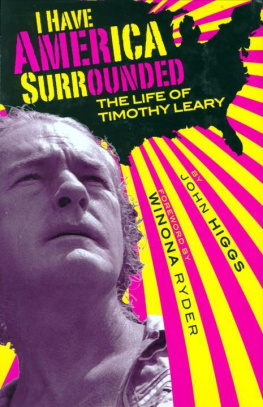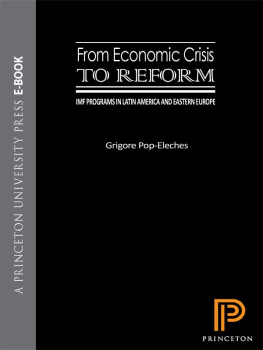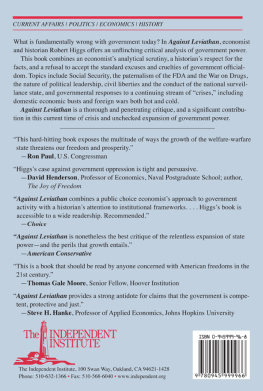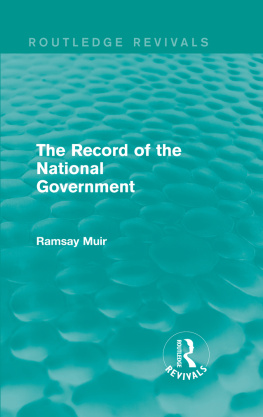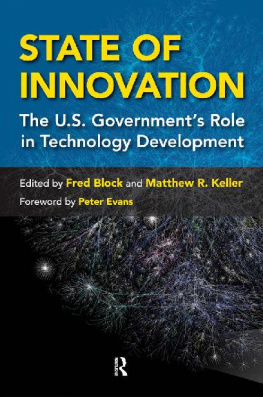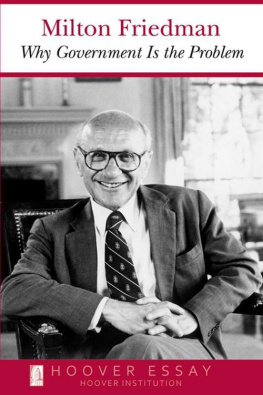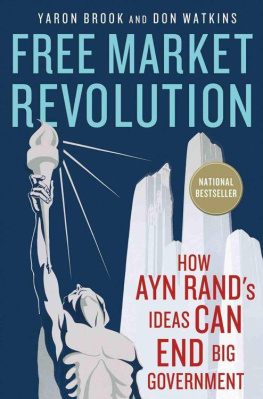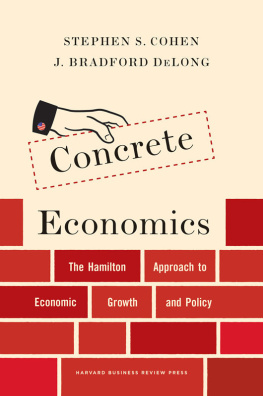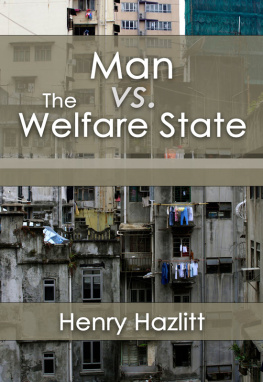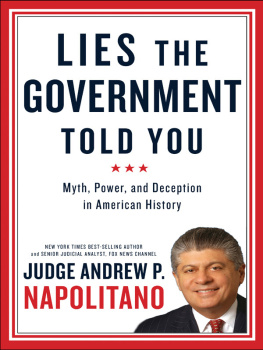WITH A NEW PREFACE BY THE AUTHOR
ROBERT HIGGS
Crisis
and
Leviathan
CRITICAL EPISODES
IN THE GROWTH OF
AMERICAN GOVERNMENT
Foreword by Arthur A. Ekirch, Jr.

Oakland, California
About the Author
ROBERT HIGGS is Senior Fellow in Political Economy for The Independent Institute and Editor of the Institute's quarterly journal The Independent Review. He is the recipient of numerous awards, including the Gary Schlarbaum Award for Lifetime Defense of Liberty, Thomas Szasz Award for Outstanding Contributions to the Cause of Civil Liberties, Lysander Spooner Award for Advancing the Literature of Liberty, and Templeton Honor Rolls Award on Education in a Free Society.
Dr. Higgs is the editor of The Independent Institute books Opposing the Crusader State, The Challenge of Liberty, Re-Thinking Green, Hazardous to Our Health?, Arms, Politics, and the Economy, plus the volume Emergence of the Modern Political Economy. He is the author of Depression, War, and Cold War, Neither Liberty Nor Safety, Resurgence of the Warfare State, Against Leviathan, Politick ekonomie strachu (The Political Economy of Fear, in Czech), The Transformation of the American Economy 18651914, Competition and Coercion, and Delusions of Power. A contributor to numerous scholarly volumes, he is the author of more than 100 articles and reviews in academic journals.
His popular articles have appeared in The Wall Street Journal, Los Angeles Times, Chicago Tribune, San Francisco Chronicle, Society, Reason, and many other publications. He has appeared on Fox News, NPR, NBC, ABC, C-SPAN, CBN, CNBC, Radio Free Europe, Voice of America, and scores of local radio and television stations. He has also been interviewed for articles in the New York Times, Washington Post, Investor's Business Daily, UPI, Seattle Times, Chicago Tribune, WorldNetDaily, Financial Times, and elsewhere.
Higgs received his Ph.D. in economics from Johns Hopkins University, and he has taught at the University of Washington, Lafayette College, Seattle University, and the University of Economics, Prague. He has been a visiting scholar at Oxford University and Stanford University, and a fellow for the Hoover Institution and the National Science Foundation.
Acknowledgments
While I have been occupied as a full-time professor of economics, I have been preoccupied for the past six years with the research that underlies this book. The growth of American government, properly conceived, is an enormous subject. To understand it one must become familiar with the pertinent materials and findings of several disciplines, including history, law, and several of the social sciences. I could not have made much progress without the assistance of many scholars and several institutions.
For reading and commentingoften at great length and in minute detailpreliminary versions of one or more of my chapters, I am grateful to Lee Alston, Arthur Ekirch, Price Fishback, Paul Gottfried, John Hughes, Aileen Kraditor, Dwight Lee, Forrest McDonald, Douglass North, William Parker, Murray Rothbard, Andy Rutten, Charlotte Twight, John Wallis, and Gary Walton. The anonymous reviewer for Oxford University Press also gave me some good last minute advice on revision.
For providing me with copies of published papers and drafts of works in progress, I am grateful to Terry Anderson, Ben Baack, Edward Budd, Jon Elster, Max Hartwell, Michael Hechter, Albert Hirschman, Joseph Kalt, James Kau, Allen Kelley, Gary Libecap, Karl-Dieter Opp, E. C. Pasour, Edward Ray, Joseph Reid, Hugh Rockoff, Richard Rose, David Schap, Harry Scheiber, and Richard Timberlake.
I was fortunate to have many opportunities to present my ideas to groups of scholars. Each occasion taught me something valuable, and I am grateful to the participants in seminars and workshops at the following universities: Washington, Houston, Texas A & M, Duke, Pennsylvania, Georgia, Pennsylvania State, Lehigh, North Carolina State, Miami (Ohio), Arizona State, George Mason, and Rutgers. Also, at the following colleges: Lafayette, Gettysburg, Holy Cross, and Montclair State. Also, at the meetings of the Economic History Association, the Public Choice Society, the Southern Economic Association, the Association of Private Enterprise Education, the Summer Institute on Public Choice Theory (sponsored by the Council for Philosophical Studies), and the Ninth International Economic History Congress. Finally, at the Greater Washington Area Economic History Seminar and the Hoover Institution on War, Revolution and Peace.
Early versions of small portions of the book appeared as articles in the Pathfinder (1982), the Freeman (1983), Continuity: A Journal of History (1983), the Intercollegiate Review (1984), and Explorations in Economic History (1985). I am grateful to the editors of these journals for giving me the opportunity to disseminate my ideas and expose them to critical notice.
The Pacific Research Institute for Public Policy has sponsored the project from its inception. I am grateful to William Mellor, David Theroux, Bruce Johnson, Charles Baird, and Gregory Christainsen for accommodating me so graciously and sticking with me in spite of the delays. Not the least of the Pacific Research Institute's favors was introducing me to the Center for Libertarian Studies. The Center made a significant financial contribution to the success of my project by awarding me a Ludwig von Mises Fellowship in the Humanities and Social Sciences during 19831984.
I began the project at the University of Washington and completed it at Lafayette College. At Washington I learned much from students and colleagues. In particular, discussions with Douglass North over a period of some fifteen years stimulated my interest in studying the growth of government. In addition, Doug assisted me in so many other ways that I shall not be able to repay him. But I shall never forget, nor shall I cease to appreciate deeply, all he has done for me. At Lafayette, President David Ellis and Provost Sarah Blanshei generously supported my research. Jerry Heavey, chairman of the economics department, made exceptional efforts to ease the difficulties of my relocation. Ron Robbins, Marie Ciofalo, and others at Skillman Library consistently assisted my scholarship by tracking down fugitive documents, rushing a book order, or interrupting their daily routine to make copies for me. Mandy Shane, my student assistant during 19831984, aided me considerably. My secretaries, Carol Riffert and Elaine Molchan, have lightened my burden in countless ways.
After I had, with great relief, completed the final draft and sent it to the Pacific Research Institute to be readied for publication, Donald McCloskey read the draft and convinced me that it was not good enough, that I ought to revise it one more time. For this heartbreaking last-minute intervention I should thank him? In any event, the reader owes McCloskey a debt; his painstaking advice on how I could improve the exposition has resulted in a better book.
Finally, Kathy and Matt, loves of my life, have made my efforts seem worthwhile. They have put up with my obsession, my reading books while eating breakfast, my working until late at night and during weekends, and my constant whining about not getting any work done. Matt helped me cope with our computer; he also made it draw the graphs in Chapters . Early in the project Kathy worked as my research assistant. Later, when other things occupied her, she never failed to support and encourage me and serve as my sounding board. She knows why the book is dedicated to her. Without her it simply would not have been written.
Next page
